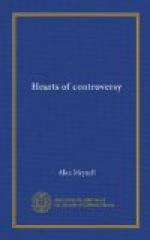That time—surpassing and correcting the century then just past in “taste”—was resolved to make a low leg to no age, antique or modern, in the chapter of the passions—nay, to show the way, to fire the nations. Addison taught himself, as his hero “taught the doubtful battle,” “where to rage.” And in the later years of the same literary century Johnson himself summoned the lapsed and alien and reluctant fury. Take such a word as “madded”—“the madded land”; there indeed is a word created for the noble rage, as the eighteenth century understood it. Look you, Johnson himself could lodge the fury in his responsible breast:
And dubious title shakes the madded land.
There is no author of that time of moderation and good sense who does not thus more or less eat a crocodile. It is not necessary to go to the bad poets; we need go no lower than the good.
And gasping Furies thirst for blood in vain,
says Pope seriously (but the sense of burlesque never leaves the reader). Also
There purple vengeance bath’d in gore retires.
In the only passage of the Dunciad meant to be poetic and not ironic and spiteful, he has “the panting gales” of a garden he describes. Match me such an absurdity among the “conceits” of the age preceding!
A noble and ingenious author, so called by high authority but left anonymous, pretends (it is always pretending with these people, never fine fiction or a frank lie) that on the tomb of Virgil he had had a vision of that deceased poet:
Crowned with eternal bays my ravished
eyes
Beheld the poet’s awful form
arise.
Virgil tells the noble and ingenious one that if Pope will but write upon some graver themes,
Envy to black Cocytus shall retire
And howl with furies in tormenting
fire.
“Genius,” says another authoritative writer in prose, “is caused by a furious joy and pride of soul.”
If, leaving the great names, we pass in review the worse poets we find, in Pope’s essay “On the Art of Sinking in Poetry,” things like these, gathered from the grave writings of his contemporaries:
In flaming heaps the raging ocean
rolls,
Whose livid waves involve despairing
souls;
The liquid burnings dreadful colours
shew,
Some deeply red, and others faintly
blue.
And a war-horse!
His eye-balls burn, he wounds the
smoking plain,
And knots of scarlet ribbon deck
his mane.
And a demon!
Provoking demons all restraint remove.
Here is more eighteenth-century “propriety”:
The hills forget they’re fixed,
and in their fright
Cast off their weight, and ease
themselves for flight.
The woods, with terror winged, out-fly
the wind,
And leave the heavy, panting hills
behind.
Again, from Nat Lee’s Alexander the Great:




